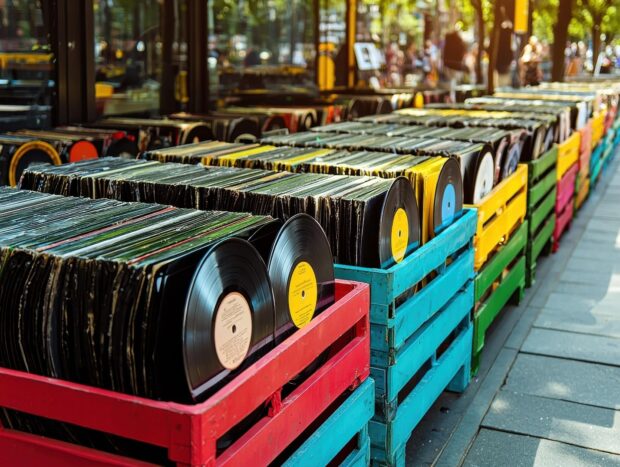Vinyl records have long been a cherished medium for music lovers, offering more than just sound—they embody a rich sensory experience. For fans of classic rock, the allure of vinyl is undeniable, as it serves as a tangible connection to the era that defined a generation. From the tactile pleasure of holding an album cover to the warmth of analog sound, vinyl offers something uniquely satisfying in an increasingly digital world. Brendan Geier, an avid vinyl enthusiast, captures this sentiment perfectly, emphasizing the cultural and emotional resonance of these records.
A Legacy Preserved in Sound
Classic rock vinyl albums represent a golden age of music, marked by groundbreaking artistry and cultural upheaval. Bands like Led Zeppelin, The Rolling Stones, and Fleetwood Mac produced records that weren’t just collections of songs but cohesive artistic statements. Each track was carefully arranged to create a narrative or evoke a specific mood, a concept often lost in today’s world of streaming playlists and single-song downloads.
Vinyl preserves these records in their original form, offering an authentic way to experience the music as the artists intended. The format’s limitations, such as the finite space on each side of a record, demanded thoughtful curation. This intentionality imbues classic rock vinyl with a sense of craftsmanship that resonates deeply with collectors and listeners alike.
The Sensory Experience of Vinyl
Unlike digital music, which is intangible and often disposable, vinyl offers a multi-sensory experience. The act of playing a record involves a ritual: removing it from its sleeve, carefully placing it on the turntable, and lowering the needle. These steps engage the listener in a way that enhances their connection to the music. The slight crackle and pop as the record begins to play evoke a sense of nostalgia, transporting listeners back to a time when music was a shared, deliberate activity.
The visual appeal of vinyl is another factor in its enduring popularity. Album covers, often designed by renowned artists, serve as iconic representations of the music within. From the hypnotic simplicity of Pink Floyd’s The Dark Side of the Moon to the provocative imagery of The Beatles’ Abbey Road, these covers are works of art in their own right. For collectors, owning a vinyl album is akin to possessing a piece of history.
A Warmth That Digital Can’t Replicate
One of the most commonly cited reasons for vinyl’s resurgence is its superior sound quality. Many audiophiles argue that analog recordings capture a warmth and depth that digital formats lack. While digital music is often compressed to save space, vinyl retains the full range of sound, allowing listeners to hear nuances that might otherwise be lost. This richness is particularly noticeable in classic rock, where intricate guitar solos, layered harmonies, and dynamic percussion play a pivotal role.
Listening to vinyl also encourages a more intentional approach to music consumption. Unlike the convenience of streaming, vinyl requires effort and commitment. This deliberate engagement fosters a deeper appreciation for the music, encouraging listeners to experience albums in their entirety rather than skipping between tracks.
Collectibility and Cultural Significance
The resurgence of vinyl has also been fueled by its status as a collectible. Original pressings of classic rock albums can fetch high prices on the resale market, particularly if they are rare or in pristine condition. For many collectors, the hunt for a specific record is as thrilling as owning it. Record stores, flea markets, and online auctions become treasure troves, each find adding to the collector’s personal connection with the music.
Beyond their monetary value, vinyl records hold cultural significance. They are artifacts of a bygone era, embodying the ethos and spirit of the 1960s and 1970s. Each scratch and scuff on a record tells a story, adding to its character and charm. In a world dominated by disposable media, vinyl offers a tangible link to the past, reminding us of the enduring power of music to bring people together.
Vinyl in the Digital Age
The digital revolution may have transformed the music industry, but it has also sparked a renewed appreciation for analog formats. Millennials and Gen Z, generations raised on streaming, have embraced vinyl as a way to connect with the music of their parents and grandparents. For these listeners, vinyl represents authenticity and permanence in an era of fleeting digital trends.
Record companies have responded to this demand by reissuing classic rock albums and even pressing new releases on vinyl. These reissues ensure that a new generation can experience the magic of records while maintaining their connection to the past. Additionally, the vinyl revival has sparked innovation in turntable technology, with modern designs offering improved sound quality and convenience.
The Community of Vinyl Enthusiasts
Another key aspect of vinyl’s appeal is the sense of community it fosters. Collectors often share their finds, discuss rare pressings, and trade recommendations in online forums and at record fairs. This communal aspect mirrors the social experience of classic rock itself, which was often enjoyed in groups and at live performances.
The resurgence of vinyl has also given rise to a new wave of independent record stores, creating spaces where enthusiasts can gather and share their passion. These stores serve as cultural hubs, preserving the tradition of discovering music in a tactile, personal way.
A Lasting Legacy
As the world becomes increasingly digitized, the enduring appeal of vinyl speaks to a deeper human desire for connection and authenticity. Classic rock albums, with their timeless melodies and cultural significance, find their perfect home in this format. Vinyl offers more than just music; it provides an experience, a sense of nostalgia, and a tangible link to a golden age of creativity.
For fans and collectors, vinyl records are more than just items—they are expressions of identity and passion. Whether displayed on a shelf or spun on a turntable, these records remind us that great music transcends time, continuing to inspire and unite generations.
